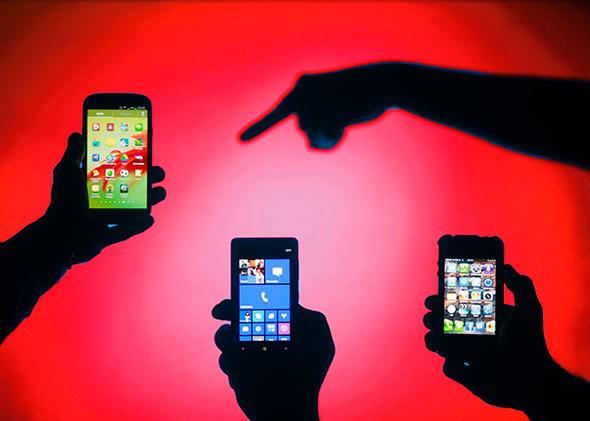Apple, it’s over. I’m breaking up with you. Because of your tax-ducking ways, I won’t buy another phone or computer or tablet or even song from you. This was not an easy decision. My very first computer was the desktop who shared my name: the Lisa. It seemed like kismet. And since then, it’s been Macs and iPhones all the way. But now I’m done. I don’t know what the next technology I’ll buy for myself and my family will be, but it won’t be made by you.
This week, along with millions of other Americans, I’m recovering from the hefty check I send every year to Uncle Sam. As individuals, we pay, on average, 28 percent of our annual incomes in state and federal income taxes. If Apple’s past performance is any indication, the company will end up paying maybe half that.
Plenty of companies do their utmost to find tax loopholes. But Apple stands out as the biggest company in the world. Its shares are worth about $460 billion—tens of billions of dollars more than those of its closest competitor, Google. Apple’s profits last year were greater than the profits reported by Google, HP, Intel, and Cisco combined.
Apple also stands out because of the lengths to which it has gone to lower its tax bill. As Charles Duhigg of the New York Times put it: “Even among tech companies, Apple’s rates are low. And while the company has remade industries, ignited economic growth and delighted customers, it has also devised corporate strategies that take advantage of gaps in the tax code, according to former executives who helped create those strategies.” Last year the company’s tax avoidance schemes were the subject of a congressional investigation. CEO Tim Cook testified that Apple paid about $6 billion in federal taxes in 2012. According to Forbes, that came out to a tax rate of 14 percent, far less than the 25 percent Apple claimed it paid in a statement to the government. Cook didn’t mention the $9 billion Apple didn’t pay by shifting $36 billion in worldwide sales away from the U.S., into overseas tax havens. According to Duhigg, the company paid very little in state taxes.
Indeed, according to Sen. Carl Levin of Michigan, Apple has achieved the “Holy Grail of tax avoidance” by finding loopholes that allow the company to shelter its profits from taxation, not only in the U.S. but anywhere else on the planet. Apple’s crowning achievement is known as the “Double Irish With a Dutch Sandwich,” a nickname for a complex series of money transfers, through a series of tax havens, starting in Ireland, swinging through the Netherlands, cutting back through Ireland, and then ending up in banks in the Caribbean or other tax-free zone.
I understand that this is all perfectly legal. Let me invoke what’s come to be called the Michael Kinsley law: The scandal isn’t what’s illegal; the scandal is what is legal.
At last year’s Senate hearings, Sen. Rand Paul of Kentucky said that it would be malpractice for Apple to pay a penny more than the minimum its accountants say it owes. Perhaps Paul feels that the company’s fiduciary obligation outweighs its obligation to help support the nation that made and continues to make its profitable activity possible.
It used to be considered patriotic to help support the country. And not so long ago, corporate federal taxes accounted for about 35 percent of the nation’s total tax revenue. Now they account for about 18 percent. As with many of Apple’s creative endeavors, however, its competitors have rushed to follow down the trail it has blazed, leaving the rest of us to pick up the tab. I wish the privileges that corporations got with their Supreme Court upgrade to personhood were matched by the obligations that we, the actual people, have.
Cook urged Congress to revise the tax code at last year’s Senate hearing. Certainly that would be a rational way to address the loopholes that allow corporations to avoid paying much of their tax bill. But a recent study from Princeton suggests that legislative efforts to change the tax code are unlikely to benefit the middle class. “Multivariate analysis indicates that economic elites and organized groups representing business interests have substantial independent impacts on U.S. government policy, while average citizens and mass-based interest groups have little or no independent influence,” the authors concluded. The collective preferences of “economic elites” were 15 times as important as everything else.
Until something gives, I’m launching a boycott of one. No more Apple products for me. Perhaps you will say that’s not much; maybe so, but it’s a small thing I can do. And perhaps I can recruit others to my cause. If that happened, here’s reason to hope the company could change its ways: Last summer Starbucks volunteered to pay 10 million pounds (about $16 million) to the English treasury after a consumer boycott and some raucous demonstrations outside its coffee shops. The protest was prompted by the revelation that the coffee giant had not paid any taxes at all to the national coffers for the previous three years. And earlier this week, Starbucks announced a plan to move its European headquarters to London and pay even more. What if Apple’s taxpaying customers here could band together like the Brits and shame the company into forking over its fair share? It’s a vision worth giving up my iPhone for.
So Apple, we’re done. It’s not me; it’s you.
